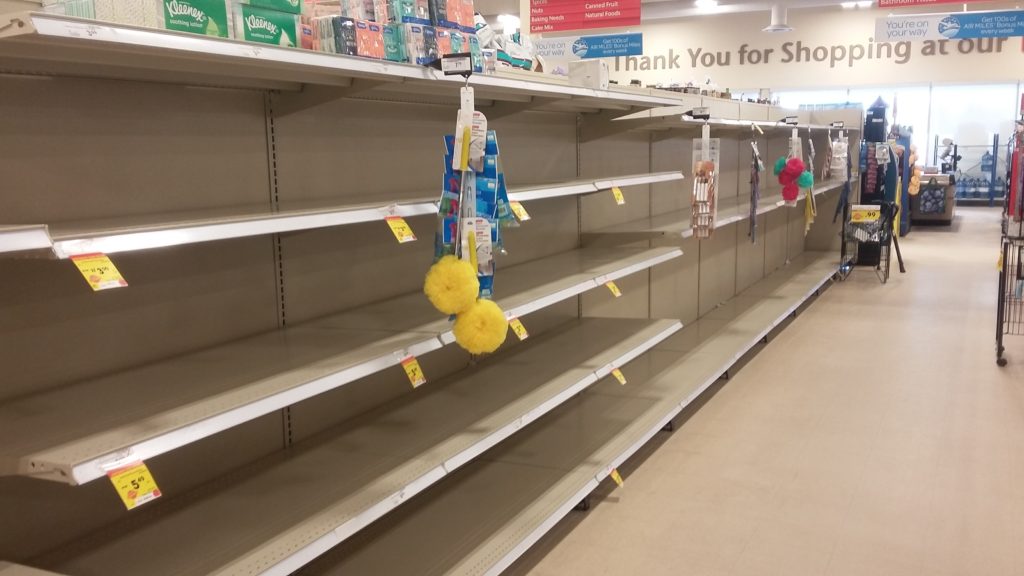Health care community implements measures to limit spread of COVID-19

March, 17, 2020
By Nate Smelle
On March 11 the World Health Organization upgraded the status of the COVID-19 outbreak to a global pandemic. Since then the total number of confirmed cases has climbed to more than 182,000. As of press time on Tuesday, March 17 in Canada there were 424 confirmed cases, with 177 of those cases documented in Ontario.
As the tallies continue to climb, the national, provincial and global response to the pandemic have been evolving rapidly. To protect the public and prevent the spread of the virus locally the Quinte Health Care North Hastings Hospital in Bancroft is taking several precautions, such as screening individuals as they come into the hospital; imposing visitor restrictions, cancelling in-person appointments at the Children's Treatment Centre; and, suspending volunteer activity within the hospital. For more information the public is advised to visit the “Hospital specific information page” at www.qhc.on.ca/hospital-information-covid-19.php.
The Bancroft Family Health Team has also increased its patient screening, and temporarily cancelled all non-essential appointments, including injection appointments, foot care and chiropody appointments, as well as meditation and cardiac and pulmonary rehabilitation groups. Anyone who usually relies on these health care services in need of emergency care is advised to call 613-332-1565, extension 220.
Currently there has yet to be any lab-confirmed cases of COVID-19 in the area, however Hastings Prince Edward Public Health Unit has identified 35 probable cases in the region. While according to the HPE Public Health unit's medical officer of health Piotr Oglaza the risk of contracting COVID-19 locally remains relatively low, he said it is critical that the public take measures to protect themselves and reduce the potential for transmission.
Because COVID-19 is a respiratory virus that is transmitted similar to influenza or the common cold, Oglaza stressed the importance of: social distancing; practicing good personal hygiene; thoroughly washing one's hands with soap and water or an alcohol-based hand sanitizer multiple times each day; and, practicing cough etiquette.
“Very basic infection protection measures like washing your hands and using alcohol-based hand sanitizers; coughing or sneezing into your sleeve or a tissue and then washing your hands; as well as social distancing and keeping two metres is very effective,” explained Oglaza.
“One of the most important measures is to avoid touching your face, so you do not put any sort of infectious materials that you may have picked up on your hands from touching a door knob or shaking hands into the mucous membrane in your mouth, eyes or nose.”
Oglaza added that wearing a surgical mask is not a good idea because it actually increases the risk of allowing the virus to enter your system when you put on and adjust the mask. The only time someone might be required to wear such a mask, he said, is if they are already exhibiting symptoms.
Oglaza said symptoms of COVID-19 range from mild cold-like symptoms to severe illness with fever, cough, difficulty breathing and pneumonia. Oglaza advises anyone exhibiting symptoms to self-isolate and contact HPEPH at: 613-966-5500 or 1-800-257-2803. As the first step in fighting the spread of COVID-19, he said this initial phone call is incredibly important.
“If someone has severe symptoms, say they are short of breath, having difficulty breathing and feeling very unwell, they might need to call 9-1-1,” cautioned Oglaza.
“If someone is feeling well otherwise and can cope, the key here is to avoid just going into their doctor's office, emergency department or a walk-in clinic, because then you are entering a room where other people are waiting for health reasons and you might potentially infect them. That is why this first call to public health to determine whether an individual should be tested for COVID-19 and self-isolate until the results are known is so important.”
Taking into consideration that more people will be advised to self-isolate as the number of confirmed cases continues to rise, Oglaza said people need to be prepared to stay in their homes for two weeks. He said this means: gradually stocking up on non-perishable foods over the next few weeks; filling essential prescriptions immediately (for an extra month if possible); purchasing over-the-counter pain/fever medications; stocking up on pet food, cleaning supplies and hygiene products; and, developing a contingency plan to ensure that children or other dependents are cared for in the event self-isolation or quarantine is necessary.
Considering the rapidly evolving nature of the crisis, Oglaza said it is essential for the public to know the risks by keeping up to date with accurate information regarding the COVID-19 outbreak. For the latest updates visit the Hastings Prince Edward Public Health Unit website: www.hpepublichealth.ca.
Since Prime Minister Justin Trudeau's wife tested positive for the virus after returning home from a trip to the United Kingdom, the two have been in self-isolation at Rideau Cottage in Ottawa. The Prime Minister emerged from self-isolation last Friday to hold press conference detailing the government's response to the ongoing crisis. In order to limit the spread of COVID-19, he announced that the Government of Canada has: reduced the number of airports where international flights are permitted to land; stepped up efforts to screen travellers entering Canada; and, banned cruise ships caring more than 500 people from docking at Canadian ports until July. The federal government is also asking all international travellers entering Canada to self isolate for 14 days.
Last week the Government of Ontario also announced a series of measures it was taking to combat the virus, including: closing all publicly-funded elementary and secondary schools; requesting hospitals to scale back elective surgeries to increase the province's capacity to manage the outbreak; and, temporarily closing all casinos. In addition, several public events have been canceled or postponed; and major sporting leagues such as the National Hockey League, the National Basketball Association have suspended their seasons. Several other professional and amateur sports have also postponed or canceled competitions.
|
